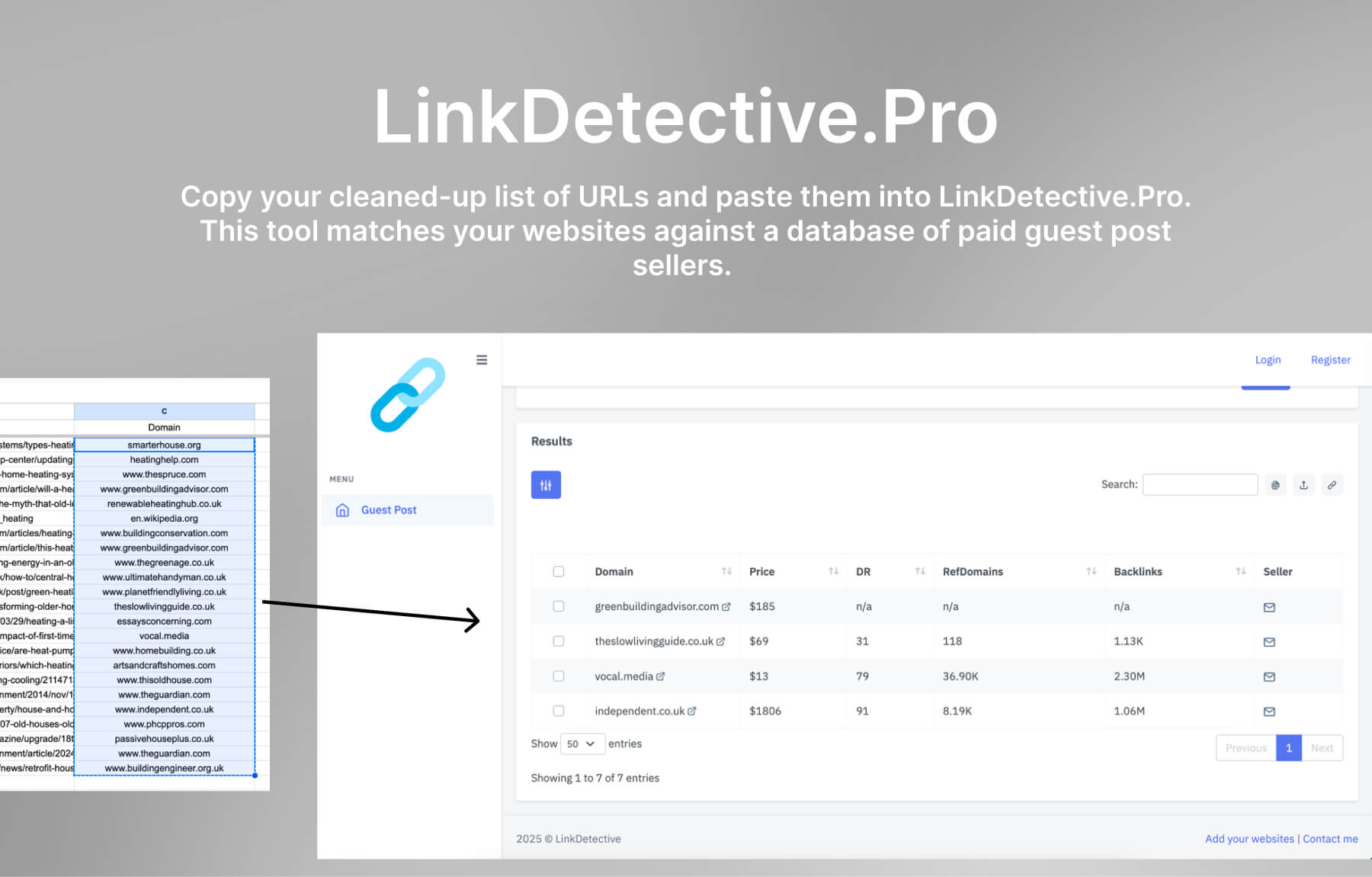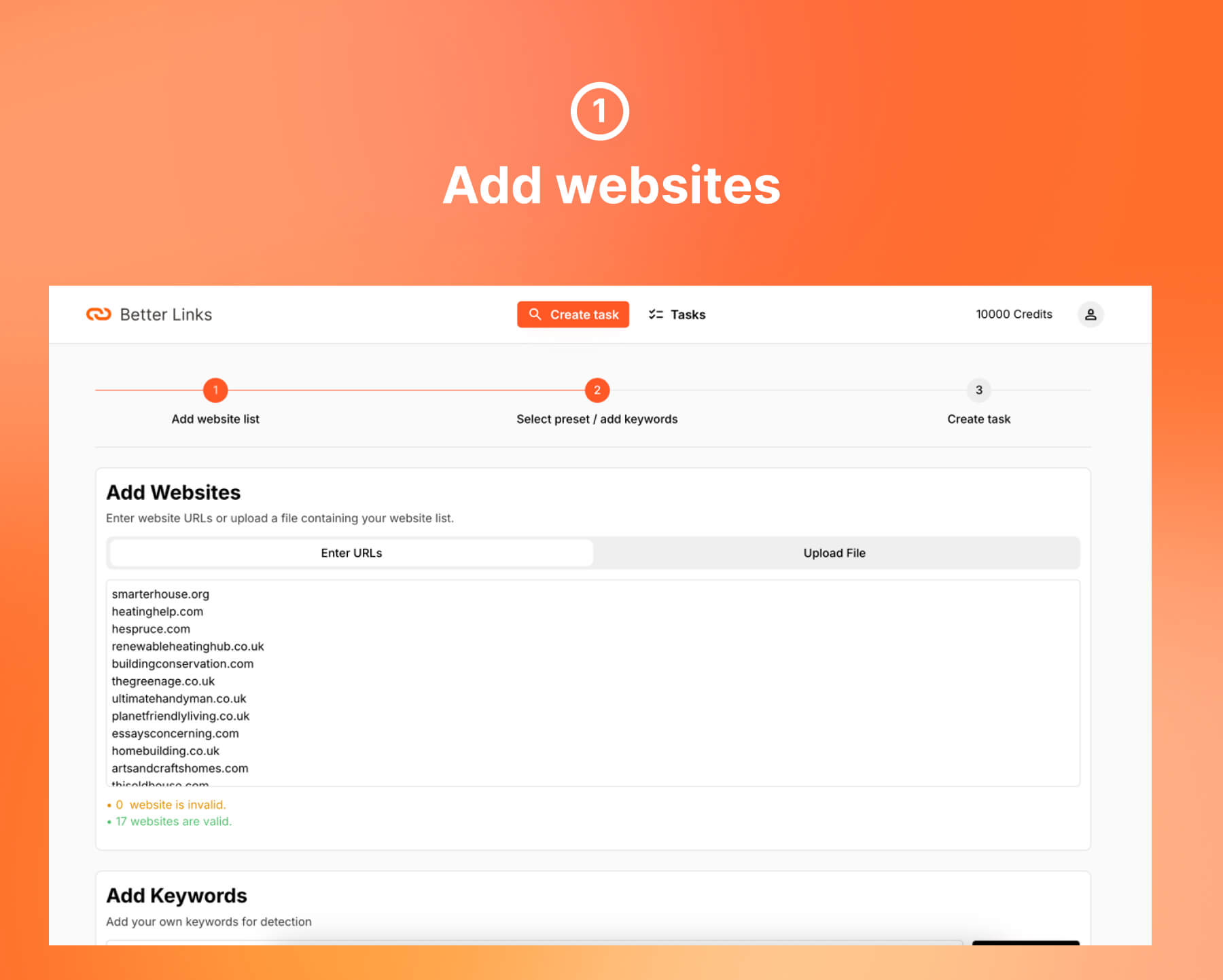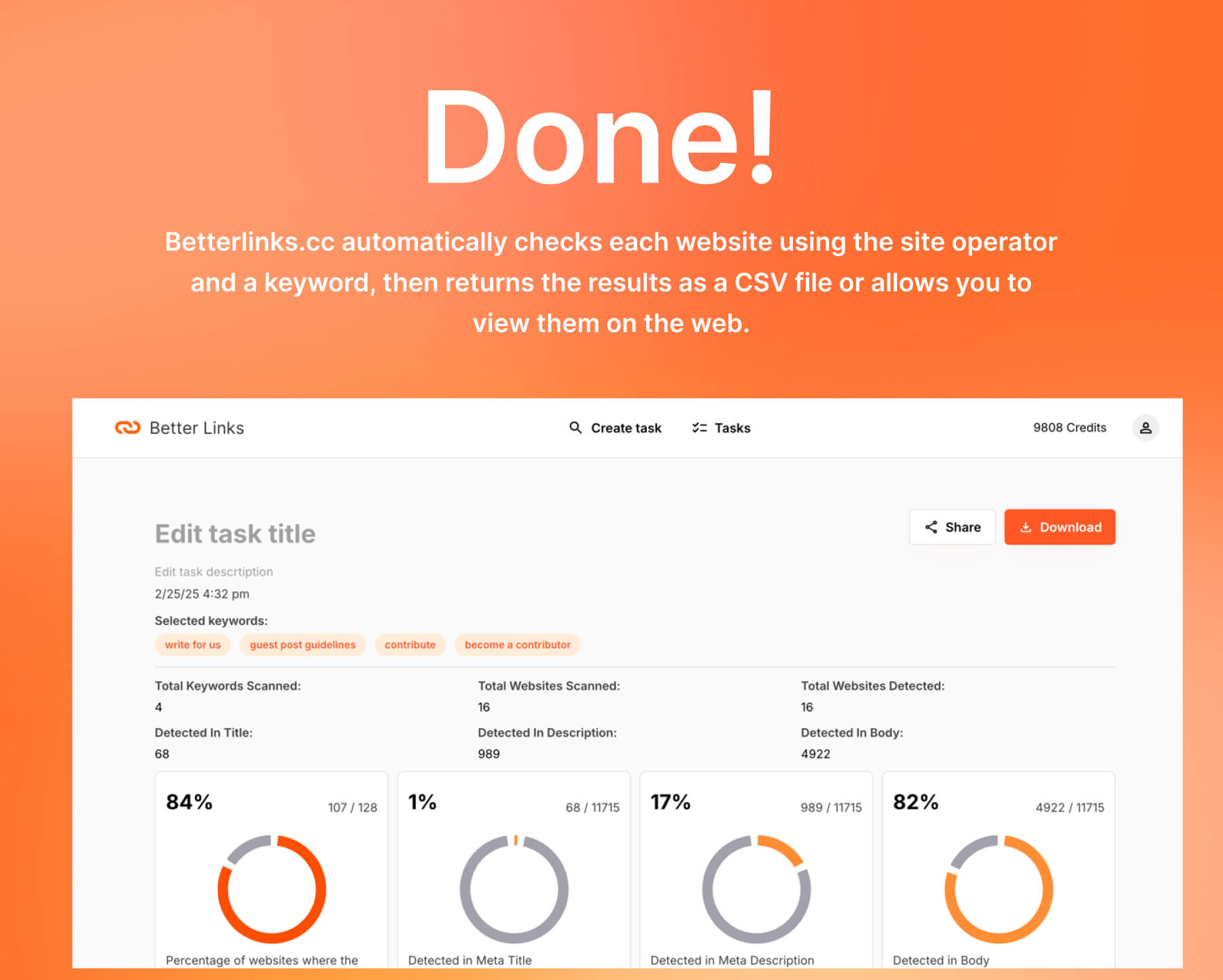Guest posting is a powerful way to build backlinks and grow your online presence.
To find the right websites in your niche, follow these steps:
1. Create a List of Keywords
A solid keyword list is your starting point. Focus on informational and long-tail keywords rather than commercial ones.
Commercial keywords often lead to product or business websites—similar to the ones you’re trying to build backlinks for—which isn’t ideal here.
For example, if you’re in the plumbing niche, consider these:
✅ Informational keywords that will uncover higher % of private blogs and news sites:
- Old house heating system
- What to do with an old oil heating system
- What is the best boiler to buy?
❌ Commercial keywords that will show more commercial websites that are less likely to offer guest posts:
- Plumber London
- Boiler replacement service
Informational keywords tend to uncover private blogs and news sites, while commercial keywords mostly pull up competitors’ pages.
Aim to prepare at least 5-10 keywords for your initial search. The more keywords you have, the more opportunities you’ll discover.
2. Use Google Search & Export SERPs Easily
For each keyword, perform a Google search. To quickly export the top 100 results (known as SERPs), install the SEOquake Chrome extension.
This handy tool lets you download all 100 website URLs with a single click, saving you tons of time.

3. Categorize Websites with AI
Next, you’ll need to sort the exported URLs into categories.
Tools like Grok 3, Deepseek, or GPT Pro work well for this. Use the following prompt to analyze each batch of 100 URLs:
Prompt for Categorizing 100 SERP URLs with Expanded Categories
Objective
You are tasked with analyzing and categorizing 100 URLs from a Search Engine Results Page (SERP) into one of the following 15 detailed categories. These URLs are not necessarily tied to a specific niche, so the categories are designed to be broad and inclusive to accommodate a wide variety of website types.
Categories and Definitions
1. Blogs and Personal Websites
Definition: Sites run by individuals or small teams, often with a personal tone, sharing opinions, experiences, or expertise.
Examples: WordPress blogs, Medium publications, personal portfolios with blog sections.
2. News and Media Websites
Definition: Professional sites publishing news articles, features, opinion pieces, or media content.
Examples: CNN, BBC, TechCrunch, Vogue.
3. Corporate Websites
Definition: Official sites for companies or businesses, focusing on company information, products, or services (without a primary e-commerce focus).
Examples: Apple.com, Microsoft.com.
4. E-commerce Websites
Definition: Sites primarily designed for selling products or services online.
Examples: Amazon, eBay, Etsy, Shopify stores.
5. Social Media Platforms
Definition: Platforms where users create profiles, share content, and connect with others socially.
Examples: Facebook, Twitter, Instagram, LinkedIn.
6. Forums and Discussion Boards
Definition: Sites focused on user-generated discussions, questions, and community interaction.
Examples: Reddit, Quora, Stack Overflow.
7. Educational Websites
Definition: Sites offering courses, tutorials, academic resources, or learning materials.
Examples: Khan Academy, Coursera, university websites like Stanford.edu.
8. Reference Websites
Definition: Sites providing informational content or reference materials, often neutral and factual.
Examples: Wikipedia, Encyclopedia Britannica, HowStuffWorks.
9. Government Websites
Definition: Sites operated by government bodies or official public institutions.
Examples: USA.gov, NHS.uk, IRS.gov.
10. Non-Profit and Charity Websites
Definition: Sites run by non-profit organizations, charities, or advocacy groups aiming to raise awareness or support causes.
Examples: RedCross.org, WWF.org, Amnesty International.
11. Entertainment Websites
Definition: Sites focused on providing entertainment content such as videos, music, games, or celebrity news.
Examples: Netflix, Spotify, IMDb, Twitch.
12. Review Websites
Definition: Sites dedicated to user or expert reviews of products, services, or experiences.
Examples: Yelp, TripAdvisor, CNET.
13. Directories and Listings
Definition: Sites that list other websites, businesses, or resources, often for navigation or discovery.
Examples: Yellow Pages, DMOZ, Angie’s List.
14. Portfolios and Showcase Websites
Definition: Sites designed to display an individual’s or company’s work, such as art, photography, or professional projects.
Examples: Behance, Dribbble, personal artist portfolios.
15. Other
Definition: Any site that does not fit cleanly into the above categories, such as niche tools, event pages, or unique web applications.
Examples: Eventbrite, online calculators, one-off landing pages.
Instructions
Categorize Each URL: Assign every URL to one of the 15 categories based on its primary purpose or function.
Resolve Ambiguity: If a URL’s purpose is unclear, perform a quick web search to determine its nature (e.g., visit the homepage or check the "About" page).
Handle Multi-Functional Sites: If a site serves multiple purposes (e.g., a corporate site with a blog), categorize it based on its primary focus (e.g., Corporate Website if the main goal is business promotion).
Subpages: For URLs that are subpages, categorize based on the root domain’s type (e.g., a blog post on a news site is still a News and Media Website).
Consistency: Use the definitions provided to ensure uniform categorization across all URLs.
Completeness: Ensure all 100 URLs are categorized with no omissions.
Output Format
Present the categorized URLs in the following structured format, with each category as a heading followed by a numbered list of URLs:
Blogs and Personal Websites
URL 1
URL 2
...
News and Media Websites
URL 1
URL 2
...
Corporate Websites
URL 1
URL 2
...
E-commerce Websites
URL 1
URL 2
...
Social Media Platforms
URL 1
URL 2
...
Forums and Discussion Boards
URL 1
URL 2
...
Educational Websites
URL 1
URL 2
...
Reference Websites
URL 1
URL 2
...
Government Websites
URL 1
URL 2
...
Non-Profit and Charity Websites
URL 1
URL 2
...
Entertainment Websites
URL 1
URL 2
...
Review Websites
URL 1
URL 2
...
Directories and Listings
URL 1
URL 2
...
Portfolios and Showcase Websites
URL 1
URL 2
...
Other
URL 1
URL 2
...
Additional Notes
Flexibility: The "Other" category ensures every URL can be classified, even if it’s highly unique.
Analysis Tips: Depending on your goal (e.g., SEO or link-building), you may prioritize categories like Blogs and Personal Websites, News and Media Websites, or Corporate Websites for further investigation (e.g., checking for blog sections).
Efficiency: For ambiguous URLs, limit research to a quick glance at the site to maintain efficiency across 100 URLs.
Note: Use a paid or advanced AI tool for best results. Free versions (like basic ChatGPT) may struggle to process 100 URLs accurately. As of now, Grok 3 handles this task most effectively.
Process each batch of 100 URLs separately to ensure accuracy and avoid overwhelming the AI.
After each categorization, copy the URLs from “Blogs and Personal Websites”, “Reference Websites” and “News and Media Websites” into a Google Sheet.
Then, move to the next step.

4. Clean Up Duplicates in Google Sheets
If you’ve processed 10 searches (100 SERPs each) using informational keywords, you might end up with around 100 Blogs/Personal Websites and 300 News/Media Websites. Now, it’s time to tidy up.
5. Check for Paid Guest Posts with LinkDetective.Pro
Copy your cleaned-up list of URLs and paste them into LinkDetective.Pro. This tool matches your websites against a database of paid guest post sellers.
The results will show you:
- Matching websites
- Key metrics (like domain authority)
- Seller details and pricing
Download this list, and you’ll know exactly which sites offer paid guest posting opportunities for easy backlink building.

6. Find Which Websites Accept Guest Posts Using BetterLinks.cc
From your initial list, some websites will be listed in LinkDetective.Pro’s database, but the rest can be checked with site search operators to determine if they are accepting guest posts, even if they aren’t openly selling them.
BetterLinks.cc is here to automate this process for us, so we don’t spend hours checking each website manually.

- write for us
- guest post guidelines
- contribute
- become a contributor
You can save the above list of keywords to the presets so you don’t need to type them; instead, just select the list from the preset selection.

Press ‘Create Task,’ confirm the task, and wait until BetterLinks.cc processes each website.
Go to the task page, and you will be able to download the results in CSV format or view them in a web view.

